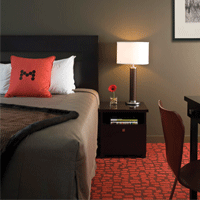Boutique hotels stay nimble in a difficult market climate
There are few neighbourhoods in Canada as charming as Old Montreal. Cobbled streets in the bustling district are a fascinating mix of historic buildings and hip new haunts. The happening ’hood is also a hotbed of successful boutique properties. But in the midst of last year’s recession, even the hottest hotels in the coolest locales felt the pinch. Thankfully, the economy is improving and boutique properties across Canada are making the most of their unique position in the market.
Montreal’s Hotel St. Paul is located at the gateway to the old city in a beautifully restored beaux arts heritage building. Valerie Chouinard, St. Paul’s director of Sales and Marketing, says that while 2009 was a challenging year, she is optimistic about the future. “Business has picked up in 2010. The situation is not nearly as daunting as it was at this same time last year,” she says. “There is still some hesitation in the market, but many of our clients whose budgets were cut are beginning to re-establish themselves.”
Hotel St. Paul is historical and handsome on the outside, but its interior is a monochromatic palette of award-winning ethereal ambiance. Even in tough times, the property had continued support from design-savvy clients in the high-end fashion and pharmaceutical industries. Chouinard says they negotiated with rate-sensitive customers in order to retain and attract business during the economic slow down. Competition was — and remains — fierce and a difference of just a few dollars can make or break a booking. Luckily, the independent 120-room hotel has more flexibility than larger corporate brands when it comes to changing procedures and adapting its strategy. But the biggest boon for St. Paul was its personalized service. “Our clientele doesn’t want to stay in a big chain hotel. They want an individual experience,” says Chouinard. “Some larger hotels say they have a ‘boutique feeling,’ but when you have more than 150 rooms it’s hard to offer the same attention to detail that we do.”
Maintaining a high level of intimate service has been paramount during the past 18 months at Ottawa’s luxury boutique property, ARC The Hotel. General manager Steve Yates joined ARC in April 2009, but has spent most of his 20 years in the industry working at branded hotels. “I understand both sides of the market,” Yates says, “and being boutique is what allows you to provide truly personal service.”
Every morning the seasoned GM holds an operations meeting to discuss his guests’ particular needs. “With 112 rooms, we have the ability to understand all of our clients’ expectations and idiosyncrasies. We focus on making emotional connections with guests.” A chilled glass of Prosecco awaits new arrivals, for example, and the hotel recently launched a mobile phone application that links to the concierge. Now, a hungry guest can place a room service order from the airport and have dinner served as soon as they get to their room. “We take care of our guests and we also take care of our staff. ARC culture is about continuous learning and support,” says Yates.
He admits that being located in the nation’s capital has been advantageous, as Ottawa hasn’t experienced the same drastic fluctuations in business as many other cities have. The hotel’s corporate market has remained strong, although leisure business has been most affected. ARC opened in 2000 and has strong ties to the tourism industry, which has helped the property continue to thrive. “There’s no question about it; 2009 was not a fun year for anyone in tourism,” Yates says. “But things are turning around. The market is being revitalized and occupancy is up.”
Brian Stanford, director at PKF Consulting, says boutique properties experienced the greatest erosion of all segments, with occupancy down about six per cent in 2009, compared to about five per cent for the market overall. Nevertheless, he notes that despite the more pronounced decline, the boutique market actually maintained the strongest occupancy and average daily rate of all segments. In 2009, boutique properties saw an occupancy rate of 65 per cent and an ADR of $163, where upscale properties came in at 63 per cent and $155 and the overall market was at 58 per cent and $125. “Boutique hotels are higher position properties and in a recession it’s the luxury dollar that is impacted the greatest,” Stanford says.
According to a Statistics Canada special report released in April 2010, the impact of the recession was not as devastating as some original predictions suggested it would be. StatsCan chief economic analyst, Philip Cross, reported that the recession was “…less severe than the previous two and markedly less severe than in most other countries.” Real GDP in Canada fell 3.3 per cent between the third quarter of 2008 and the third quarter of 2009, compared with 3.7 per cent in the U.S. and even greater declines in Europe. Tentative numbers also show that the recession lasted only three quarters in Canada, but four to six quarters in other G7 countries.
While the report is positive, there’s no denying the effect the recession had on the hotel industry. “Overall industry profitability was down by more than 30 per cent in 2009, and it is projected to see a modest recovery of about five per cent in 2010,” Stanford says. Early 2010 numbers have been influenced by the Olympic Games held in Vancouver in February. “The burst of activity in Vancouver is having a ripple effect on national data, showing that all rates are up. When we take that data out of the equation, rates remain relatively flat,” notes Stanford.
Indeed, the Olympics provided a welcome boost for Vancouver tourism. The Moda Hotel, a 57-room boutique property located in the city centre, was fully booked, hosting groups from Russia, Italy and Canada. “The Vancouver Olympic Committee secured huge blocks of rooms with the majority of hotels and, as a result, it dictated the rates for those hotels,” says Stella Evans, Moda’s business development manager. “Some properties, including Moda, didn’t participate in the VOC program and ended up with higher rates.”
Formerly the Dufferin Hotel, which was constructed in 1908, the property underwent major renovations after changing hands in 2005. Unlike most hotels in Canada — boutique or otherwise — occupancy has increased every year at Moda, even in 2009. “It’s hard to get an accurate picture because we’ve been going through renovations and building the website. There have been a lot of changes for us in the past few years, so it’s a unique situation,” Evans says.
Moda positions itself as a mid-scale property offering affordable indulgence. It’s a strategy that has worked well to attract corporate travellers seeking a budget-friendly boutique experience. “Moda has a proactive sales and marketing team and excellent customer relations with its corporate clients,” says Evans, who has worked as an industry consultant for more than 25 years. Internet marketing, including social networking tools like Facebook and Twitter, has played an important part in the hotel’s success.
Rates will continue to increase at more and more hotels across the country as the economy grows. “Looking at the next couple of years, we’ll definitely see a rebound,” says PKF’s Stanford. “Many consumers who had to put things on hold are coming back into the market. It might be a few years before we see 2008 numbers, but we’ll get there.” And as the market recovers, boutique properties have at least one advantage: Everyone knows that good things come in small packages.





















